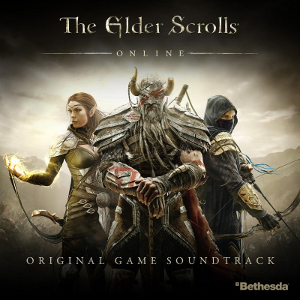The Elder Scrolls Online Original Game Soundtrack
 |
Album Title: The Elder Scrolls Online Original Game Soundtrack |
| Record Label: Bethesda Softworks |
|
| Catalog No.: N/A |
|
| Release Date: April 2, 2014 |
|
| Purchase: Download at Amazon MP3 |
Overview
The Elder Scrolls games, developed and produced by Bethesda, have been a huge success, particularly since the release of Morrowind and the subsequent Oblivion and Skyrim chapters. The series takes place on the continent of Tamriel, each game focusing on a different country within Tamriel, while the player controls a highly customized character through the fantasy RPG world. The Elder Scrolls games have traditionally been scored by Jeremy Soule; each game contains a variation of the iconic main theme of the series as well as a plethora of new themes woven into the scores to represent the countries featured in each game. The Elder Scrolls Online is the first MMO of the series, and opens up most of Tameriel for the gamer to explore. It is also the first of the Elder Scrolls games since Morrowind which is primarily scored by a composer other than Jeremy Soule. Brad Derrick, best known for his work on Warhammer Online, scored the majority of The Elder Scrolls Online, creating a new epic score to add to the archives of Elder Scrolls music.
Body
The first track, “For Blood, for Glory, for Honor”, is actually the only one in the score composed by Soule, in which he returns to reinvent the main theme of the Elder Scrolls. Each game since Morrowind has a different realization of the theme; in Morrowind, “Nerevar Rising” opens on a gentle series of woodwinds and piano, Oblivion begins dramatically with “Reign of the Septims” on pulsing strings and low brass, and Skyrim‘s main menu features “Dragonborn”, in which the same theme is realized by an all-male choir, reminiscent of a Nordic chant. I was so happy to hear ESO open in the same vein. “For Blood, for Glory, for Honor” opens with a long introduction, first with very light strings with abruptly descend to a lower octave after about thirty seconds, meeting with various brass instruments of all ranges and then choir about a minute into the song. At 1:15, that familiar theme enters dramatically, and for those die-hard Elder Scrolls players out there, it feels a little like coming home. Even though Soule does not have any other tracks on this score, the first track promises us the continent of Tamriel, despite the MMORPG gameplay.
The rest of the soundtrack delivers. Derrick seems to have taken his job in stepping up to Soule’s position seriously, and the resulting soundtrack is pretty spectacular. For one, Derrick later brings Soule’s theme back in one of the final tracks, “Tides of the Abecean Sea”, on a much more subtle piano, although we don’t even need that track to let us know that we’re still in Tamriel. “Moons of the Evening Star” incorporates a beautiful pattern on harp, vaguely reminiscent of Morrowind‘s “Peaceful Waters”; except that after a minute of the harp, a striking alto soloist enters with a new melody, echoed later on thick strings and xylophone. Another similar theme, “Moth, Butterfly, and Torchbug”, follows the style of many of Soule’s nocturnal themes. The track opens with a heavy choral theme and breaks into a series of solo instruments weaving together a series of melody lines into one cohesive and complex piece, sounding at times ethereal, and at times almost folksy.
And of course we can’t have a decent Elder Scrolls soundtrack without our heart-pounding battle tracks. “Weapons Drawn” uses low strings and percussion, followed by high strings, to induce a constant rhythm which is later met with mid-range brass instruments and strings to create a memorable, albiet short, battle theme. “Oath of Malacath” follows a similar pattern, but uses a low-pitched men’s chorus to add weight to the pulsing rhythms; a female choir also adds to the upper range, and begins alternating with the male choir to create a dialogue that ultimately becomes a melody and countermelody. The battle themes aren’t the only tracks that break the peaceful mood of the soundtrack. “Sands of the Alik’r” contains several drawn-out notes and harmonies, but the fluctuation of dynamics and occasional appearance of rattlesnake-like percussion sounds keep the player on his or her toes. Even when the solo instruments submit to high strings or choir, or when the piece ends with some acoustic guitar, there is just enough dissonance to keep it from sounding as soft or gentle as some of the other tracks on this disc while still sounding, at times, deceptively tranquil.
I have to mention one of my favorite pieces here. “The Towers Cast Long Shadows” opens as an all-string piece featuring soloists from all different sections of the string orchestra, and occasionally lightly accented with vocals and a single oboe. The melody itself is simple, jumping across octaves and alternating between various instruments, sounding similar to a Skyrim dusk theme. The low strings keep a soft percussion between melodic realizations of the melody. As the piece continues, the movement in the strings subsides, and the choir plays a larger role. The piece ends with oboe, strings, vocals, and light malleted percussion, and the final hopeful chord is held by soprano choir and strings, fading into silence. Rik Schaffer’s two contributions “The Heart of Nirn” and “Northpoint Nocturne” also both make my top ten list in this soundtrack. Both pieces are over five minutes long, and contain fully-developed themes using strings, brass, woodwinds, and soft choir to create rich melodies and harmonies that stretch out over time and ebb and flow like the best of Soule’s work. Schaffer’s contributions to ESO, while small in content, added significantly to Derrick’s already-notable work.
Finally, the soundtrack to The Elder Scrolls Online closes with a song, unusual for the Elder Scrolls series, but similar to Soule’s Guild Wars 2. The singer, Judith De Los Santos — better known by her pseudonym Malukah — actually started as a YouTube cover artist, receiving viral attention with her cover of “The Dragonborn Comes” from Skyrim. Her addition to ESO, “The Beauty of Dawn”, keeps with the style of the rest of the soundtrack, featuring acoustic guitar and layered vocal lines, both of which are Malukah herself, as the primary instruments. I am not always a fan of video game soundtracks ending with a song (or film scores, for that matter), but this one worked; it was not a jarring pop song, there were no instruments used that weren’t used in the rest of the soundtrack, and it could have almost worked as a tavern song if not for the sheer talent that went into it.
Summary
Overall, the soundtrack for The Elder Scrolls Online is a beautiful addition to the legacy left by Soule in the Elder Scrolls series; despite the change of composer, the score is impressive, true to the series, and just as epic as the previous games. The addition of Soule, Schaffer, and Malukah contributed greatly to the soundtrack as a whole, while Derrick brought the soundtrack together with plenty of high-quality tracks reminiscent of the series’ past. An excellent soundtrack to an excellent series, and certainly worth the investment for any soundtrack enthusiasts out there.
Do you agree with the review and score? Let us know in the comments below!
4.5
Posted on June 28, 2014 by Emily McMillan. Last modified on June 29, 2014.














